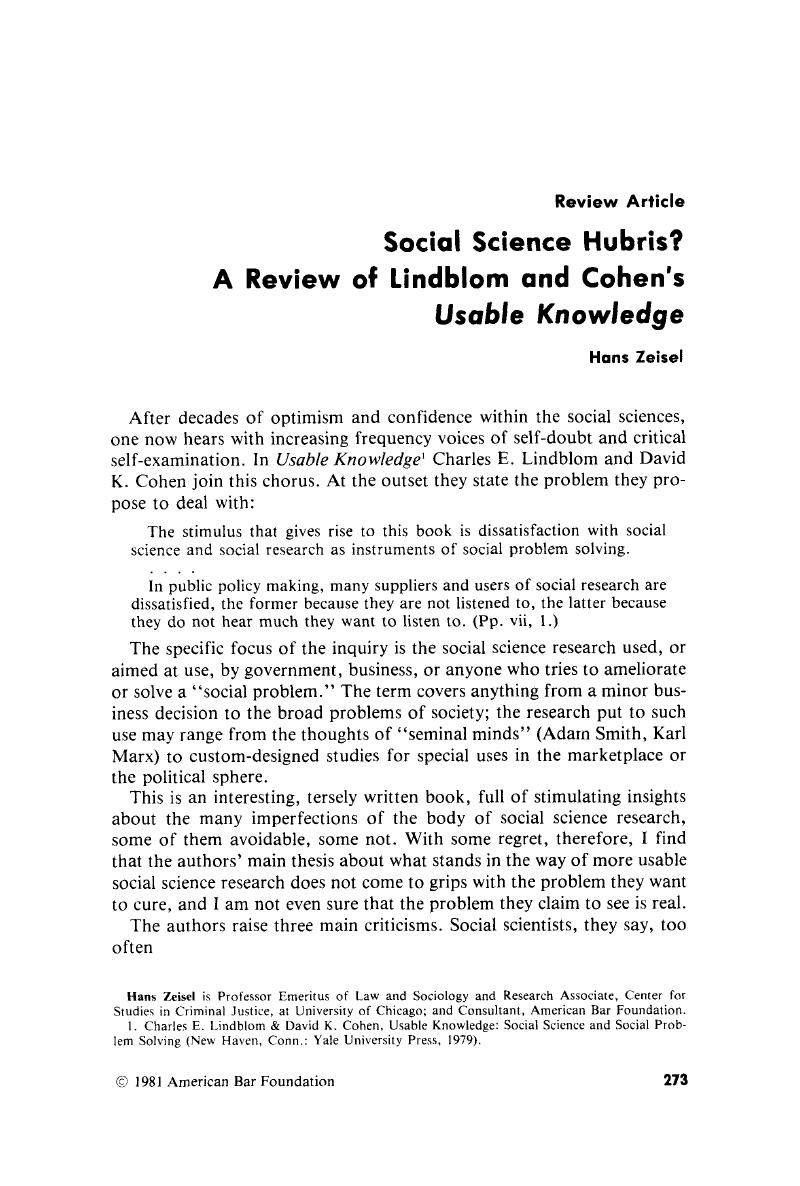No CrossRef data available.
Published online by Cambridge University Press: 20 November 2018

1 Charles E. Lindblom & David K. Cohen, Usable Knowledge: Social Science and Social Problem Solving (New Haven, Conn.: Yale University Press, 1979).Google Scholar
2 The addition of the expert intuition does not always improve the decision. I may be forgiven for relating a personal experience: After the end of World War II, I sat on some dais next to L. D., an old friend who was the advertising account executive for one of our large oil companies. For many years I had been research director of that agency and so I asked, “How is the … company doing?” He answered, “All right; but they would have done better had they followed your advice.” When I shook my head in amused puzzlement, he added, “Don't you remember when during the war you made some estimate of the size of gasoline consumption after the war?” I then remembered, and my friend added, “Your estimate happened to be on the nose, but … did not believe it; they remembered the depression after World War I, and failed to expand their refinery capacity.”.Google Scholar
3 Lazarsfeld, Paul F., The American Soldier—An Expository Review, 13 Pub. Opinion Q. 377, 378 (1949).Google Scholar
4 In fairness to the authors I must report that the above evaluation is mine. It is in conflict with the view of the investigators: Richard A, Berk, Lenihan, Kenneth J., & Rossi, Peter H., Crime and Poverty: Some Experimental Evidence from Ex-Offenders, 45 Am. Soc. Rev. 766 (1980). My dissent will be published as “Disagreement over the Evaluation of a Controlled Experiment.”.Google Scholar
5 Irving L. Janis & Leon Mann, Decision Making: A Psychological Analysis of Conflict, Choice, and Commitment (New York: Free Press, 1977).Google Scholar
6 I have had the good fortune twice to participate in such comprehensive first efforts: in 1932, in the first study of the psychological effects of unemployment (Marie Jahoda, Paul F. Lazarsfeld, & Hans Zeisel, Marienthal: The Sociography of an Unemployed Community, trans. John Reginall & Thomas Elsaesser with the authors (Chicago: Aldine-Atherton, Inc., 1971) (first published Leipzig: S. Hierzel, 1932)); and more recently, 1964, in the first comprehensive study of the jury system (Harry Kalven, Jr., & Hans Zeisel, The American Jury (Boston: Little, Brown & Co., 1966; Chicago: University of Chicago Press, Phoenix Books, 1971)).Google Scholar
7 Paul F. Lazarsfeld, Bernard Berelson, & Hazel Gaudet, The People's Choice: How the Voter Makes Up His Mind in a Presidential Campaign (3d ed. New York: Columbia University Press, 1968).Google Scholar
8 Paul F. Lazarsfeld, The Obligations of the 1950 Pollster to the 1984 Historian, in Paul F. Lazarsfeld, Qualitative Analysis: Historical and Critical Essays 278–99 (Boston: Allyn & Bacon, Inc., 1972).Google Scholar
9 See Kalven & Zeisel, supra note 5 for the jury study. The passage on baseball indices is in Hans Zeisel, Say It with Figures 84–86 (5th ed. New York: Harper & Row, 1968) (first published in 1947).Google Scholar
10 Lawrence R. Klein in 1980.Google Scholar